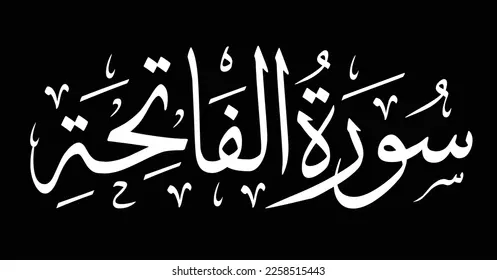Surat al-Fatiha, also known as
"The Opening," holds profound significance in Islam. It is the first
chapter of the Quran and is considered one of the most essential and central
elements of Muslim worship and spiritual practice. Here’s a brief overview of its
importance.
Reciting surah Al-fatiha deepens one's understanding of monotheism (Tawheed) and strengthens faith in Allah's power and authority: Seeking Guidance: The Surah includes the verse "Guide us on the Straight Path"(Quran 1:6) which is a profound supplication for seeking Allah's guidance in all aspects of life. Surah al fatiha serves as mean of deepening one's connection with Allah. Reciting it with sincerity and devotion is seen as a way to draw closer to God. The Quranic verses within this Surah emphasize the importance of faith (Imaan) and belief in Allah's divine plan.
Abu Hurayrah narrated that the messenger of Allah said that Allah said, "I have divided the prayer (Al-Fatiha) into two halves between Myself and my servanr, and my servant shall have what he asks for. "If he says, "All praise and thanks to be Allah, the Lord of existence. Allah says, "My servant has praised me."
Spiritual
and Liturgical Importance:
- Foundational Role in Prayer: Surat al-Fatiha is recited in every unit of the
Muslim prayer (Salah). Its recitation is obligatory and serves as the core
of the prayer, emphasizing its centrality in daily worship.
- Comprehensive Praise and Supplication: The chapter encapsulates essential elements of
Islamic belief, including the praise of Allah, acknowledgment of His
mercy, and the plea for guidance. It opens with glorification of Allah's
attributes, such as His sovereignty and compassion.
- Guide for Life:
The Surah provides a blueprint for spiritual and moral guidance. It
expresses a profound request for help in following the "straight
path," which is a call for living a righteous and just life according
to Allah’s commands.
Thematic
Significance
- Unity of God:
Surat al-Fatiha emphasizes the monotheistic essence of Islam. It
reinforces the belief in the oneness of God and His exclusive right to be
worshipped, which is a fundamental tenet of Islamic faith.
- Mercy and Compassion:
The Surah highlights Allah’s attributes of mercy and compassion, serving
as a reminder of His kindness and forgiveness. This fosters a sense of
hope and trust among believers.
- Guidance and Support:
The chapter’s supplication for guidance on the "straight path"
signifies the believer’s continual need for divine support and direction
in navigating life’s challenges.
Cultural
and Theological Impact
- Educational Tool:
Surat al-Fatiha is often one of the first sections of the Quran taught to
Muslim children and new converts, making it a key element in the education
and spiritual formation of Muslims.
- Universal Appeal:
The Surah is recited by Muslims worldwide in various contexts, reflecting
its universal relevance and the shared spiritual values of the Muslim
community.
- Reflective Practice:
The verse’s phrases are frequently used in personal supplications and
reflections, highlighting its role in fostering a personal connection with
Allah.
In summary, Surat al-Fatiha is not
just an introductory chapter of the Quran but a profound expression of Islamic
faith and spirituality. Its recitation in daily prayers underscores its vital
role in guiding and shaping the lives of Muslims, making it a cornerstone of
Islamic worship and devotion.
Surat al-Fatiha, often referred to
as "The Opening" or "The Opener," holds profound
significance in Islamic tradition. Here’s a detailed look at its importance:
1.
The Essence of the Quran
Surat al-Fatiha is considered the
essence of the Quran. It is the opening chapter of the holy book and
encapsulates the core themes of Islamic belief: the oneness of God, His mercy,
guidance, and sovereignty. It’s a summary of the Quranic message, presenting a
concise yet comprehensive declaration of faith.
2.
Foundation of Islamic Prayer
In Islamic worship, Surat al-Fatiha
is recited in every unit (rak'ah) of the Muslim prayer (Salah). Its recitation
is obligatory, making it central to the daily acts of worship for Muslims. The
chapter is often referred to as "Umm al-Kitab" (The Mother of the
Book) due to its fundamental role in prayers.
3.
A Source of Spiritual Guidance
The chapter is a supplication for
guidance, mercy, and support from God. It begins with praise for God, the Lord
of all worlds, and continues by asking for His guidance on the straight path.
This makes it a daily reminder of the need for divine assistance and a guide for
righteous living.
4.
Healing and Protection
Surat al-Fatiha is also considered
to have healing properties. In various Hadiths (sayings of the Prophet
Muhammad), it is described as a cure for physical and spiritual ailments. Its
recitation is believed to offer protection from harm and serve as a source of
comfort and tranquility.
5.
A Key to Understanding the Quran
The chapter provides a framework for
interpreting the Quranic text. It sets the stage for the themes that will be
explored throughout the Quran, emphasizing God's attributes, the importance of
following His guidance, and the need for spiritual awareness.
6.
Cultural and Social Impact
Surat al-Fatiha is recited in
various contexts beyond regular prayers, including at the beginning of
significant events, during moments of distress, and in gatherings. Its
recitation is a means of invoking God's blessings and seeking His favor in
various aspects of life.
7.
Interfaith Dialogue
In interfaith contexts, Surat
al-Fatiha serves as a point of reflection on shared values such as the
universal need for guidance, compassion, and moral integrity. Its universal
themes resonate across different cultures and faith traditions, fostering understanding
and dialogue.
Overall, Surat al-Fatiha is much
more than just a chapter of the Quran; it is a cornerstone of Muslim faith and
practice, reflecting the essence of Islamic spirituality and devotion.

